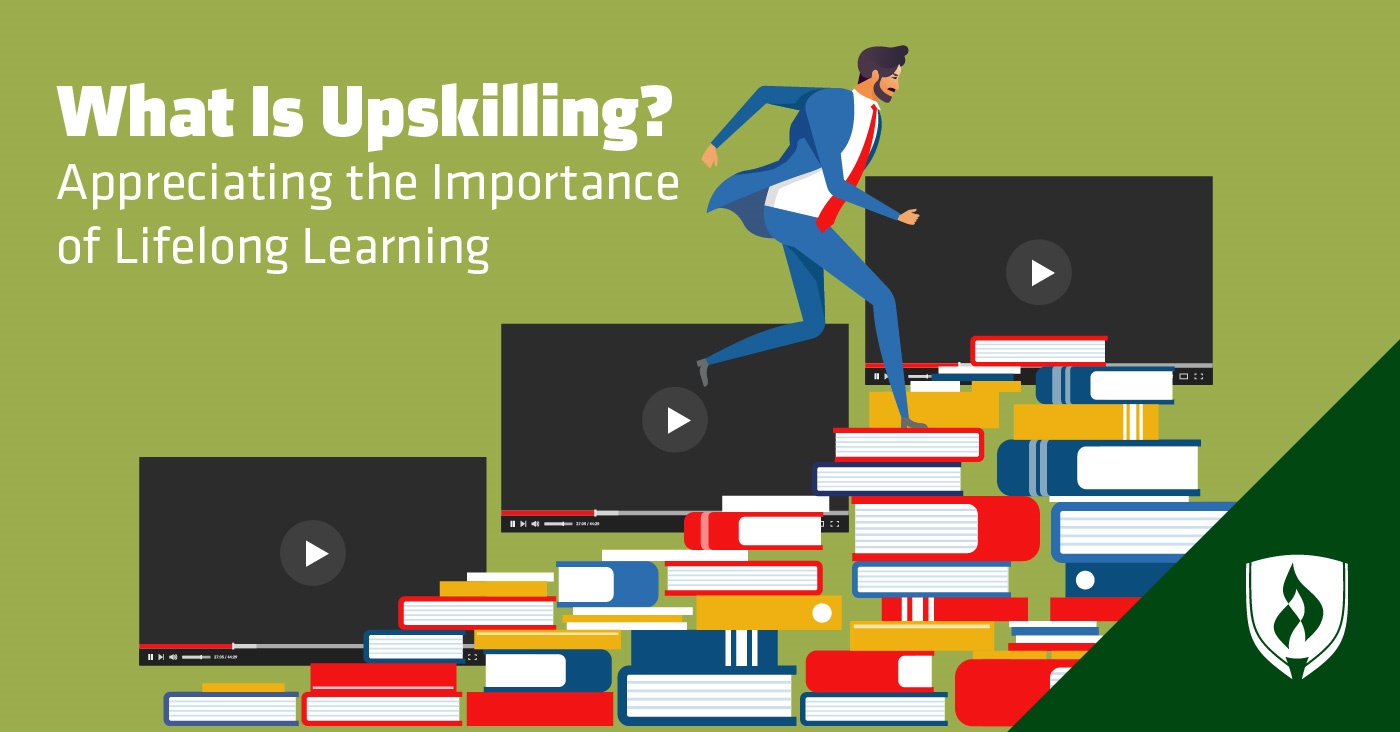
You’re a curious person. It seems like you’re always diving into a new internet rabbit hole as you search for more information about your latest obsession. From historical figures to foreign languages, there’s no limit to the random topics you’d love to learn more about.
You’ve always thought this was just a personality quirk—but you may be surprised to hear that your thirst for knowledge is an in-demand trait that can give you a career boost. It’s called upskilling, and it can be the key that unlocks the next phase of your professional career.
What is upskilling? This buzzword refers to the type of continuing education that you can leverage to level up your career qualifications, whether it’s climbing the ladder at your current organization or pursuing an entirely new career.
Upskilling is a hot topic in the workplace, so we talked to career coaches to find out what you need to know about this important trend. Read on to discover how you can harness the power of lifelong learning to improve your career!
What is upskilling?
Upskilling is “constantly learning more things inside one’s industry, or even outside of it,” says Stephanie Thoma of Confident Introvert. Professionals often pursue upskilling when they’re looking to gain new skills and experience to stay relevant or move into a higher position within their field.
Some workers also leverage their pursuit of learning into opportunities in entirely new career fields. This is typically called “reskilling,” although some people use the terms interchangeably. Both upskilling and reskilling can help you achieve your career goals.
People who pursue professional learning opportunities have “a mindset backed by action and the desire to be current, if not ahead of the curve, as the work world shifts,” Thoma says. It’s no surprise that employees with this driven, motivated mindset are in high demand in the workforce. It’s all thanks to the importance of lifelong learning.
Why is lifelong learning so important?
The importance of lifelong learning has been well documented. Of U.S. workers who pursued professional training in 2016, 47 percent said it helped them advance in their current position, while 29 percent used their additional education to find a new job and 27 percent pursued an entirely new career path, according to the American Psychological Association.1
It’s not only the additional knowledge that’s helped these professionals expand their careers. Employers want to hire workers with a growth mindset and the ability to learn. “From the employer's point of view, the ability to learn and readiness to raise qualifications in ever-changing industries are the competences of the future," says Jacques Buffet, career expert at Zety.
Furthermore, the advantages of upskilling aren’t limited to fast-paced fields like technology. Workers in any industry can reap the benefits of continuous learning. Just by challenging yourself to learn new things and stepping out of your routine, you’re ‘exercising’ your brain and preparing yourself to adapt to changes in the world.
How to upskill: 6 Ideas from the experts
You can see that upskilling is an important way to advance your career and prove your ability to employers. Now you need to know how to start levelling up your skills—especially since you’re already balancing your career with family and hobbies.
The good news is, upskilling doesn’t have to be time consuming or expensive! Use these tips from our experts to get started.
1. Take career development courses
Professional courses are a good starting point for gaining new or more advanced skills—and they don’t have to break the bank! Buffet points out that “many companies have a training budget in place that you can use for this purpose,” so don’t be shy about taking to your current employer about any funding they may have available.
These types of courses are often available through colleges, professional organizations or membership communities. Do some research to find out what’s available in your industry and location—there may be some surprising opportunities out there.
2. Pursue professional certifications and credentials
In many industries there are professional organizations offering certification or credential programs to prove your skill level in a particular area of expertise. These professional certifications and credentials can serve as an at-a-glance confirmation of your skills for potential employers.
Typically certifications and credentials require applicants to complete an exam, and often those exams include suggested study materials. These materials can provide an excellent roadmap to development and growing your knowledge base as you work your way toward earning a credential or certification.
3. Read relevant books
Don’t underestimate the power of reading! There are relevant books being published about topics in every industry under the sun, and many are available for free at your local library. A chat with your librarian can lead you to the latest new releases about trending topics in your industry.
Thoma also advises using books to follow your passion as you determine next steps for your career. “Embrace exploring the things you love and it will lead you to more of what you love, which can translate into a way of being that invites career success.”
4. Learn a new language
Challenging yourself to learn a new language can benefit your career in ways you might not expect! We live in a highly connected world and while technology can certainly help us bring down some language barriers, developing additional language skills never hurts.
Whether you’re aiming for more work-related travel or simply want to be able to better communicate with your organization’s partners around the globe, learning the basics of a new language is a great way to prove your dedication. Even better? There are a ton of free resources and apps out there for you to get started on the basics.
5. Conduct informational interviews
Sometimes the best way to gain a new skillset is to go straight to the source. Thoma shares that conducting informational interviews with industry professionals is a great way to upskill—and grow your professional network while you’re at it.
Look for pros who hold a job title you’re aspiring to, whether it’s in your organization or elsewhere. See if you have mutual acquaintances on LinkedIn who can provide an introduction if you’ve never met before. Make it easy for them to say yes by offering to treat them to coffee or lunch at a location near their workplace during the lunch hour. In a short amount of time, you may end up getting real-life insights from a pro with valuable work experience!
6. Seek information from professionals online
Don’t discount the vast amount of information available for free online! “If you are willing to upskill/ reskill on your own, there's plenty of free and useful knowledge available out there in the form of webinars, professional advice from experts, thematic blogs, forums, and so on,” Buffet says.
Online webinars, video tutorials, and industry focused blogs can all provide excellent insight and potentially open your eyes to new areas of development—just be sure to do your due diligence and check the credentials of anyone offering information
Level up your career with upskilling
You’ve always understood the importance of lifelong learning, but now you also have the answer to “What is upskilling?” There’s no better time than today to start leveling up your career. Get started by brushing up on these 21st century skills that employers in every industry are seeking!
1American Psychological Association, By the numbers: Lifelong learning, [accessed May, 2020] https://www.apa.org/monitor/2017/02/numbers




